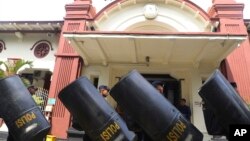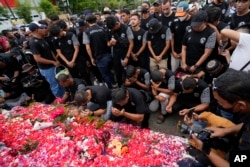An Indonesian court began trial Monday against five men on charges of negligence leading to the deaths of 135 people after police fired tear gas inside a soccer stadium, setting off a panicked run for the exits in which many were crushed.
The deadly crowd surge Oct. 1 in East Java's Malang city was among the world's worst sporting disasters. Police officers fired tear gas when fans flooded the pitch after Arema FC was defeated in a home match for the first time in 23 years by rival Persebaya Surabaya.
The match at Kanjuruhan stadium was attended only by Arema fans, as organizers had banned Persebaya supporters because of Indonesia's history of violent soccer rivalries.
Police described the pitch invasion as a riot and said two officers were killed, but survivors accused them of overreacting. Videos showed officers using force, kicking and hitting fans with batons, and pushing spectators back into the stands.
At least 11 officers fired tear gas — eight canisters into the stands and three onto the pitch — to prevent more spectators from taking to the field after the game.
An investigation team set up by Indonesian President Joko Widodo in response to a national outcry over the deaths concluded that the tear gas was the main cause of the crowd surge. It said police on duty had no knowledge that the use of tear gas is prohibited at soccer stadiums and used it "indiscriminately" on the field, in the stands and outside the stadium, causing more than 42,000 spectators inside the 36,000-seat stadium to rush to the exits — several of which were locked.
It was among the deadliest soccer-related tragedies since a 1964 crush in Peru killed over 300 people.
Prosecutors charged the five men — three police officials who allowed or ordered officers to use tear gas and the Arema FC Organizing Committee chair and security chief — with criminal negligence causing death and bodily harm, which carries a penalty of up to five years in jail if found guilty.
Lead prosecutor Ari Basuki said the three police officers had given clear instruction to their subordinates to fire tear gas.
"They did not consider the risk factors," Basuki said. "Their order to fire (tear gas) was a form of negligence and carelessness that built up the risk of a panicked crowd fleeing for exits of the stadium and a crush."
The defendants ignored the 2021 safety and security regulations made by the national soccer association that firearms and mass dispersal weapons may not be carried into nor used in the stadium, he said.
Prosecutors said the crowd's panic at the half-open stadium caused a buildup at exits 3, 10, 11, 12, 13 and 14, where many fans were crushed and trampled.
They also said PT Liga Indonesia Baru, the organizer of the soccer league, had not verified the safety of the stadium since 2020 and Arema FC's organizing committee "did not prepare an emergency plan."
Authorities in Surabaya, the capital of East Java province, deployed 1,600 security forces Monday, including police and soldiers, in and around the Surabaya District Court, and the trial is being held remotely for added security.
Arema fans, known widely as "Aremania," are prohibited from coming to Surabaya during the trial to avoid possible clash with Persebaya fans.
Rini Hanifah, a mother of three who is seeking justice for her son Agus Riansyah who died at the deadly crush, said she is disappointed by the fact that only five people went on trial for such a huge number of victims.
"I really hope that justice is truly upheld through this trial, for us little people who don't understand why this could happen," Hanifah said with tears running down her face.
National Police Chief Listyo Sigit Prabowo removed the police chiefs of East Java province and Malang district and suspended 20 other officers over violations of professional ethics since the tragedy.
Listyo said several criminal experts have been involved in investigations and none of them concluded the case meets the elements of murder or premeditated murder. The National Human Rights Commission said the Kanjuruhan tragedy was not a serious human rights violation.
Widodo's fact-finding team, which included government officials, soccer and security experts and activists, also concluded the national soccer association PSSI had been negligent and ignored safety and security regulations. They urged its chair and executive committee to quit.
A three-judge panel set the next hearing for Jan. 23, when the five defendants and their lawyers will respond to the prosecution.
Sumardhan, lawyer for defendant Abdul Haris, Arema FC's organizing committee chair, said they are still studying the prosecutors' indictment.
"Of course we believe there is no wrongdoing made by our client," said Sumardhan, who goes by a single name. "We are preparing facts to counter the prosecution against him."
About 140 witnesses are expected to testify in the court hearings, prosecutors said.





